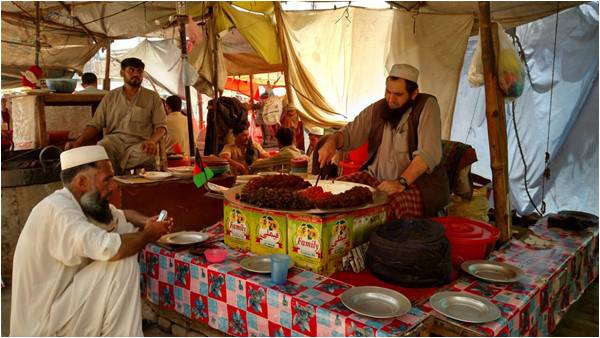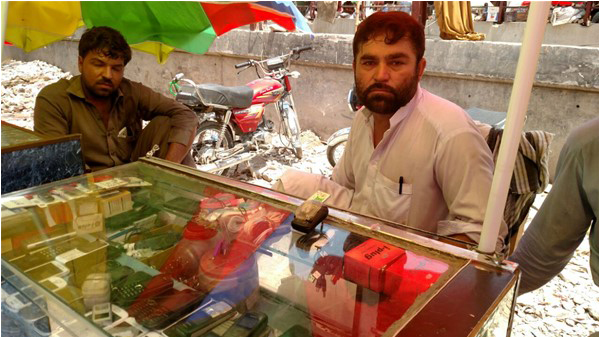
PESHAWAR – The air-coolers will be useless in Herat. So will the electric oven if the village doesn’t have electricity. This is why Peshawar’s scrap markets are flooded these days. Afghans returning home can’t offload their lives quick enough. Now is a good time to get that secondhand car as well, urges Bashir Khan, a refugee, who is sticking around to watch it all go down. He says the scrap market skyrocketed after June when the previous govenment extension ran out for Afghan refugees.
Now Pakistan has given its registered Afghan refugees till December 2016. The unregistered ones are being hunted down. The UNHCR puts the total of registered Afghan refugees at 1.5 million. Registered means you have a Proof of Registration (PoR) card issued by the National Database and Registration Authority. If you don’t have one, be prepared for detention. The government deadline and the squeeze put on by the police are convincing many families that it’s time to go—even if you’ve lived in Pakistan for decades. Fortunately, the UNHCR pays each PoR cardholder $400 in a cash grant to help with the move.

“Until June 2016, there were only 25 to 30 families leaving but now we are facilitating over 500 families a day,” says Qaiser Khan Afridi, a spokesperson for UNHCR Pakistan. The increase has been triggered by police raids and the government’s stance to expedite the process. And so, many families have already left, with a few staying back to wrap up their businesses or sell their property. Thus, just as some markets are bullish, others are slowly winding down. Peshawar’s Board Bazaar on Canal Road is one of them.
Desperate to attract customers, shops and stalls have started blaring Nusrat Fateh Ali Khan’s qawalis and Afghani songs from laptops on pushcarts parked along the road. The bazaar’s population is 98% Afghan, explains the president of its mobile market, Walayat Khan.
“Our business depends on Afghanis living in Board Bazaar area as they pay well,” says Lutfur Rahman, a 38-year-old from Nangarhar, Afghanistan. But Canal Road is thinning out each day. “We have to go back as we are losing business and being harassed by the Pakistani police,” Rahman says, adding that there is no point in staying if there isn’t any business. Rahman is leaving for Nangarhar after Eid and his two brothers left in July.
Business used to be good, though, for a long time. The bazaar has 12 markets, each with up to 50 shops from small restaurants to cloth and carpet shops. One of them is Nadir Khan Market with 25 shops famous for imported crockery. Here children chant “Sale! Sale!” to try and attract customers. “Kadday rawanay di, pa her seez sale day,” cries 10-year old Afghan Abdullah, who is using a duster to wipe down the tea and dinner sets. “Families are leaving, everything is on sale.” His father Muhammad Wali is wrapping up a 25-year-old business. “Every item in the market has been discounted by nearly half,” he explains. A Rs10,000 dinner set is available at half the price. The rates for the real estate have also fallen in Board Bazaar. One Afghan who bought a house for Rs10 million there had to sell to a Pakistani for Rs6 million.
Walayat Khan predicts all families will leave after Eid if no further extension is announced. “Many like me still hope that the stay will be extended after December as we have properties and don’t want to sell at throwaway prices,” he says. The investments include construction on rented properties where families like his have lived for 40 years. As the family expanded they added rooms and hence, value to the plot. But now the landlords won’t compensate them.
The police are also keen to make money. “Earlier on, we could easily persuade the police to let us off for Rs500,” says Bilal Ahmed who has been detained and released twice despite having a PoR card. But now the rate is Rs5,000 to Rs10,000 if they are stopped. For shopkeeper Sadiq Afghan’s family the last straw was his cousin Qomandan Khan’s nine-day detention. He was held by the police after he went shopping for his brother’s wedding in Saddar Bazaar. He missed the wedding. When he came out the family decided within the week that they would return to Laghman province after selling their property at low prices. When Afghans see a police mobile they change their route.
For whatever it is worth, Khyber-Pakhtunkhwa police chief Nasir Khan Durrani has circulated a toll-free number for registered Afghan refugees to complain against police harassment. But the mood has changed already. It was linked to the recent cross-border clashes, which the refugees feel are one of reasons why Pakistan is being aggressive about them leaving. Facebook has not helped. “Afghanis on the other side are sharing hate material against Pakistan and some people in Pakistan are doing the same against Afghanistan,” says Walayat Khan. It seems as if there is no turning back.
Raza Khan is a journalist based in Peshawar
Now Pakistan has given its registered Afghan refugees till December 2016. The unregistered ones are being hunted down. The UNHCR puts the total of registered Afghan refugees at 1.5 million. Registered means you have a Proof of Registration (PoR) card issued by the National Database and Registration Authority. If you don’t have one, be prepared for detention. The government deadline and the squeeze put on by the police are convincing many families that it’s time to go—even if you’ve lived in Pakistan for decades. Fortunately, the UNHCR pays each PoR cardholder $400 in a cash grant to help with the move.

“Until June 2016, there were only 25 to 30 families leaving but now we are facilitating over 500 families a day,” says Qaiser Khan Afridi, a spokesperson for UNHCR Pakistan. The increase has been triggered by police raids and the government’s stance to expedite the process. And so, many families have already left, with a few staying back to wrap up their businesses or sell their property. Thus, just as some markets are bullish, others are slowly winding down. Peshawar’s Board Bazaar on Canal Road is one of them.
Desperate to attract customers, shops and stalls have started blaring Nusrat Fateh Ali Khan’s qawalis and Afghani songs from laptops on pushcarts parked along the road. The bazaar’s population is 98% Afghan, explains the president of its mobile market, Walayat Khan.
“Our business depends on Afghanis living in Board Bazaar area as they pay well,” says Lutfur Rahman, a 38-year-old from Nangarhar, Afghanistan. But Canal Road is thinning out each day. “We have to go back as we are losing business and being harassed by the Pakistani police,” Rahman says, adding that there is no point in staying if there isn’t any business. Rahman is leaving for Nangarhar after Eid and his two brothers left in July.
Business used to be good, though, for a long time. The bazaar has 12 markets, each with up to 50 shops from small restaurants to cloth and carpet shops. One of them is Nadir Khan Market with 25 shops famous for imported crockery. Here children chant “Sale! Sale!” to try and attract customers. “Kadday rawanay di, pa her seez sale day,” cries 10-year old Afghan Abdullah, who is using a duster to wipe down the tea and dinner sets. “Families are leaving, everything is on sale.” His father Muhammad Wali is wrapping up a 25-year-old business. “Every item in the market has been discounted by nearly half,” he explains. A Rs10,000 dinner set is available at half the price. The rates for the real estate have also fallen in Board Bazaar. One Afghan who bought a house for Rs10 million there had to sell to a Pakistani for Rs6 million.
Walayat Khan predicts all families will leave after Eid if no further extension is announced. “Many like me still hope that the stay will be extended after December as we have properties and don’t want to sell at throwaway prices,” he says. The investments include construction on rented properties where families like his have lived for 40 years. As the family expanded they added rooms and hence, value to the plot. But now the landlords won’t compensate them.
The police are also keen to make money. “Earlier on, we could easily persuade the police to let us off for Rs500,” says Bilal Ahmed who has been detained and released twice despite having a PoR card. But now the rate is Rs5,000 to Rs10,000 if they are stopped. For shopkeeper Sadiq Afghan’s family the last straw was his cousin Qomandan Khan’s nine-day detention. He was held by the police after he went shopping for his brother’s wedding in Saddar Bazaar. He missed the wedding. When he came out the family decided within the week that they would return to Laghman province after selling their property at low prices. When Afghans see a police mobile they change their route.
For whatever it is worth, Khyber-Pakhtunkhwa police chief Nasir Khan Durrani has circulated a toll-free number for registered Afghan refugees to complain against police harassment. But the mood has changed already. It was linked to the recent cross-border clashes, which the refugees feel are one of reasons why Pakistan is being aggressive about them leaving. Facebook has not helped. “Afghanis on the other side are sharing hate material against Pakistan and some people in Pakistan are doing the same against Afghanistan,” says Walayat Khan. It seems as if there is no turning back.
Raza Khan is a journalist based in Peshawar

